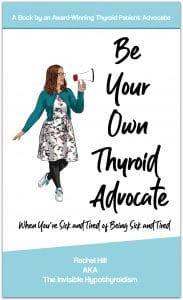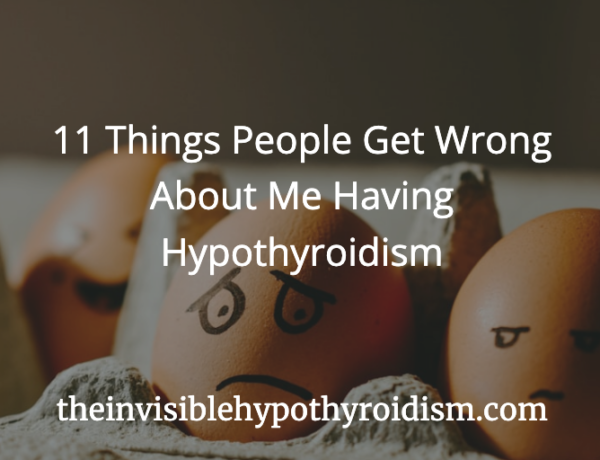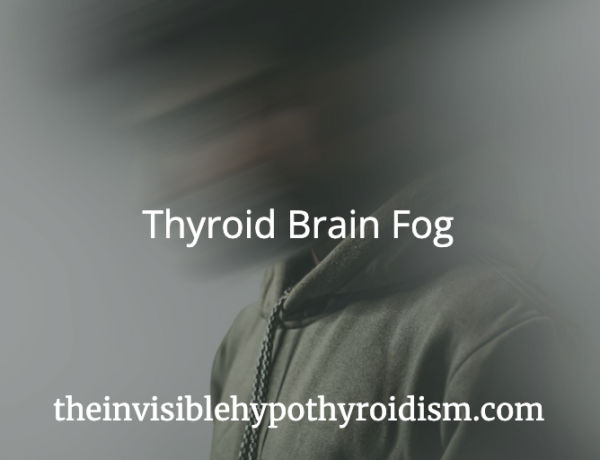Originally published on 16th May December 2017 Last updated on 12th February 2024
You’ve been diagnosed with hypothyroidism and possibly also Hashimoto’s and it’s all a bit daunting. You may not be sure what it means or what impact it will have on your life.
The truth is, hypothyroidism in almost all cases is a lifelong condition, which requires medication (thyroid hormone replacement) everyday for the rest of your life and quite often other lifestyle changes to help manage it.
But it doesn’t have to feel like a death sentence. You can still live a full life with hypothyroidism. How?!
1. Find The Right Healthcare Support
One of the most important things you can do for yourself is to find the right medical practitioner. An endocrinologist, GP, functional practitioner, naturopath or even a combination, can help you on your way to recovery. Read more about the different types of people you may wish to see here.
Thyroid patients find that some types of medical professionals are better than others when it comes to treating their hypothyroidism, but it’s up to you to find what works for you and your health.
Endocrinologists and GP’s tend be much more conventional in their approach to treating hypothyroidism, including the use of T4-only synthetic medication alone. Functional and naturopathic doctors tend to consider supplements, diet and lifestyle changes, as well as the other thyroid medication options.
You need to make it a priority to find what you need, to feel better, and if you find that it’s all too expensive, get reading up on research yourself and educate and empower yourself to become your own thyroid advocate (my book is great for this).
It’s not ideal, but many thyroid patients are doing this, including myself. We learn how to interpret our own test results, order our own tests (which may not be as expensive you think), explore new medication options and supplements or lifestyle and dietary changes. It is always best to do this with a medical professional however.
2. Read Up, Read Up, Read Up
Reading up on hypothyroidism and related conditions in books, articles, medical journals etc. will give you the knowledge you need to become your own advocate and make some changes. You’ll feel empowered and more in control of your health, too.
Find lots of books to explore here.
3. Get Your Thyroid Meds Right
Finding the right thyroid medication and your optimal dosage is also crucial.
It may require some experimenting and patience before you find your sweet spot.
Many conventional doctors and endocrinologists only prescribe T4-only medications such as Levothyroxine or Synthroid, which is the inactive thyroid hormone T4, and hope your body converts it to the active thyroid hormone T3, but a lot of us have trouble converting.
So you may need to consider other thyroid medications such as synthetic T3 and natural desiccated thyroid. These can be prescribed.
4. Find Your Tribe
Living a full life also means having a good social and support network around you, to help when the times get tough and provide emotional and physical help and support.
Friends, family, neighbours, coworkers etc. should all be able to offer some kind of support or help to you and you’ll need to learn to utilise this.
Be honest with them about how you’re doing and how much thyroid disease can affect you. Get them to read this.
If you’re a parent with hypothyroidism, this can be extremely difficult to cope with at times, so don’t be afraid to ask for help. (See this book for more information on parenting when you have hypothyroidism.)
Socialising when you can will help to combat feeling lonely or isolated, and although it’s not always easy to maintain a social life whilst having thyroid disease, you can plan it in to a schedule.
Online groups and forums can also provide you with help, support, advice and even useful information to help you on your way to recovery, too. Forums are known for patients empowering other patients, giving them useful sources of information and helping you realise that you’re not alone in this battle.
With this in mind, you’ll also need to consider removing the people from your life who do the opposite. The energy suckers, the ones who bring you down or make you feel worse. If they cause you any kind of stress or negative emotions, they won’t help you in managing a condition that is so heavily linked to your stress glands, the adrenals.
5. Zone in on Stress
Stress overworks the adrenal glands, which work in balance with the thyroid. Many people with hypothyroidism therefore also have adrenal dysfunction. You may need to implement things to encourage good adrenal health, such as downtime, a good bedtime routine, a supportive diet and even supplements of essential vitamins and minerals.
We can also implement a good self-care routine. Bubble baths or Epsom salt baths can really help us to feel more looked after, but self-care needn’t stop here. Read my article all about more ideas on this!
To also encourage de-stressing, ensure you make time for hobbies, whether it includes painting, adult colouring books, sewing, reading, listening to music, photography, writing stories etc. to help keep a good work-life balance, if you also work. Whatever brings you joy and balance.
If you work, consider what would make it easier for you to maintain your job but also good health. E.g. a space heater under your desk, back support on your chair, regular breaks throughout the day from your computer screen and keeping hydrated. Read more work tips here.
6. Assess Exercise
The right exercise can also be enjoyable and give you a sense of a full, active life and get you out the house. Bear in mind though, that the wrong kind of exercise and over-exercising can do more harm than good, so it’s wise to rediscover what exercise works for you so that it doesn’t stress the body further. Many people with hypothyroidism enjoy gentle walks, yoga, pilates and swimming. Getting some fresh air and a change of scenery can be very beneficial. Just be sure to listen to your body and take it at your own pace.
***
Please also see my checklist for thyroid patients, on things you can tick off once addressed, to get you back to good health.
You can click on the hyperlinks in the above post to learn more and see references to information given.
What else would you add to this list?

The book Be Your Own Thyroid Advocate: When You’re Sick and Tired of Being Sick and Tired, which builds on this article and helps you to live a full life with hypothyroidism and Hashimoto’s.





